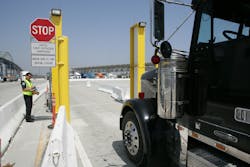The terrorist bombing of a train station in the Russian city of Volgograd in December last year – coupled with ongoing security concerns surrounding the upcoming Winter Olympic Games to be held February 7-23 in the Russian city of Sochi – is refocusing attention on transportation security issues, particularly where mass transit is concerned.
“While circumstances in Russia are unique, the Volgograd bombings conform to some long-term worldwide trends [as] terrorist attacks on surface transportation targets are increasing and are increasingly lethal, with the biggest threat posed by multiple bomb attacks or campaigns targeting crowded train stations, commuter trains, subways and buses,” Brian Michael Jenkins, director of the national transportation safety and security center within the Mineta Transportation Institute (MTI), told Fleet Owner.
“Those charged with security at those facilities worry most about terrorist bombers or armed shooters,” he added. “Physical barriers and (where possible) structural reinforcements keep large vehicle bombs away from large stations and reduce the possibility of building collapse if a device is detonated.”
Yet he noted that it is far more difficult to keep terrorists carrying bombs in backpacks or suitcases out of train stations, bus depots, and the like.
“An airport model of security is impractical for surface transportation and would not prevent bombings in areas outside of the secure areas,” Jenkins pointed out, noting that in the Volgograd train station bombing, the suicide bomber detonated his device just before reaching the security checkpoint put there to keep such bombs off trains.
However, MTI indicates a very different type of terrorist approach threatens trucking operations, particularly in the U.S., based on a report it compiled back in 2010.
“Our report concluded that the acquisition or manufacture of large quantities of explosives by terrorists in the U.S. has been made more difficult by increased security and monitoring of ingredients such as ammonium nitrate fertilizer – a common ingredient in explosive devices,” Jenkins said.
He noted that terrorists abroad have attempted to increase the lethality of truck-based bombs by adding propane tanks or toxic chemicals to them, with some discussing the substitution of available hazardous materials for explosives.
“Recent U.S. threat assessments suggest that terrorists are considering how to weaponize gasoline tankers,” Jenkins emphasized. “Although of low statistical probability, the use of vehicles carrying hazardous-materials cargos as surrogate truck bombs must therefore be considered a plausible mode of terrorist attack.”
He explained that gasoline tankers, theoretically, offer terrorists several operational attractions.
“They vastly outnumber all other hazardous-materials shipments combined; they operate in urban area [which are] target-rich environments, [and] their routes are predictable,” Jenkins noted. “The principal threat from gasoline or propane tankers is fire. Without altering the tanker itself and adjusting its contents, it can be difficult to use a gasoline tanker to create an explosion. Creating an intense fire is far easier.”
While he said it is difficult to determine how much security is enough where trucking operations are concern, as there are differences in threat levels in various parts of the country, it is preferable not to be seen as being the least protected.
“Keeping up to industry standards or following best practices also provides a defense against accusations of negligence and liability lawsuits if a vehicle is stolen and weaponized,” Jenkins emphasized.
“Assuming the terrorists have not selected a specific site because of inside knowledge gained as or by an employee, terrorists are not interested in increasing their risks, especially in the acquisition phase of their operation,” Jenkins added. “They will look for easy, unprotected facilities just as they choose “soft” targets that allow easy access. Levels of security, however, are more likely to be determined by the threat posed by thieves or vandals than by more remote terrorist attacks.”
He also stressed that security must be thought of as “more than fences” especially where trucking facilities are concerned.
“It is surveillance and counter-surveillance, which can be provided by CCTV [closed circuit television] and guards, who can also intervene or sound the alarm,” Jenkins emphasized. “And it’s not just about guards; every employee ought to be part of the security effort through awareness and vigilance. We know that terrorists reconnoiter their targets [so] they should see an alert, active staff that asks for identifications, questions strangers, and reports unusual occurrences.”
About the Author
Sean Kilcarr
Editor in Chief
Sean Kilcarr is a former longtime FleetOwner senior editor who wrote for the publication from 2000 to 2018. He served as editor-in-chief from 2017 to 2018.
